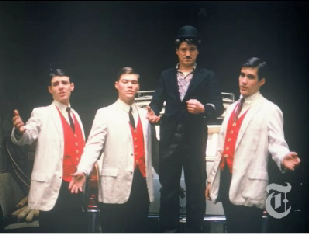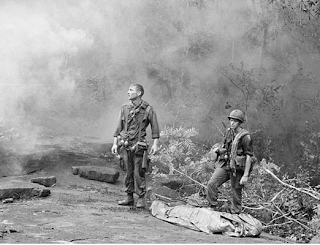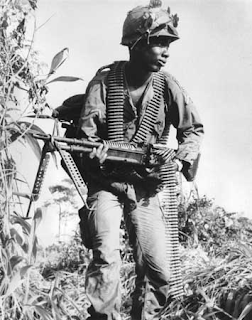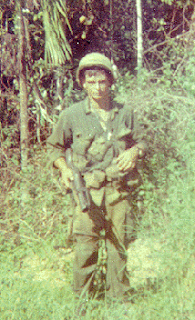A New York Times profile this morning details what Mitt Romney was doing during the Vietnam War. Although the article reflects quite poorly on his character, it demonstrates why his candidacy is resonating among our country's right-wing war-cheerleading faction. Romney's life reflects that faction's perverse "values" perfectly.
While many of his fellow citizens from 1966 to 1969 were being killed in Vietnam, Romney -- "a sheltered child of privilege" -- spent those years in Paris and other cities in France trying to convert the French to Mormonism, which enabled him to obtain a "missionary" deferment. When Romney and his fellow Mormon missionaries encountered anti-American sentiment from war opponents, they decided that the French -- unlike Romney and his war-supporting, war-avoiding friends -- were "weak":
The missionaries had often met with hostility over the Vietnam War. "Are you an American?" was a common greeting, Mr. Romney recalled, followed by, "'Get out of Vietnam! Bang!' The door would slam." But such opposition only hardened their hawkish views. "We felt the French were pretty weak-kneed," [Romney's fellow missionary Byron] Hansen said.
So early on, Romney shared one of the defining values of the political movement he now wants to lead: namely, the belief that those who want to send other people off to fight wars are "strong" and "courageous," while those who oppose sending others off to war are "weak." As Romney's co-missionary put it, perfectly encapsulating the right-wing war-cheerleaders of both then and now:
Most of the missionaries, though, were also relieved that their service meant a draft deferment. "I am sorry, but no one was excited to go and get killed in Vietnam," Mr. Hansen said, acknowledging, "In hindsight, it is easy to be for the war when you don't have to worry about going to Vietnam."
What's particularly reprehensible about all of this is that so much of the Republican Party spent years mauling Bill Clinton for avoiding service in a war that he opposed. But for years, Romney emphatically supported the Vietnam War, yet actively avoided service and never enlisted:
Many church leaders considered the war a godly cause, and Mr. Romney said at the time he thought that it was essential to holding back Communism. . . .Eventually, the great debates of the day intruded even at Brigham Young. In the fall of 1970, the student government president and others distributed a pamphlet encouraging opposition to the Vietnam conflict by quoting past Mormon leaders on the evils of war, stirring a predictable campus fury.
Mr. Romney wanted no part of such things. "If we had asked Mitt to sign that pamphlet, he would have had a heart attack," said Terrell E. Hunt, a fellow Cougar who signed it.
Mitt Romney, then and now: showing what a super-tough patriot he is by cheering on wars that other people -- but never he nor his family -- risk their lives to fight. What makes it all the more repellent is that while many Mormons did enlist -- Brigham Young was one of the few campuses that was a hotbed of pro-war activism -- Romney actively avoided service, first with his missionary deferment, and then by obtaining a student deferment once he got back from France.
And now, he has the audacity to claim that he wanted to fight, but cites his high lottery number as a reason why his supposed desire was never fulfilled -- as though there was no such thing as voluntarily enlisting:
Mr. Romney, though, said that he sometimes had wished he were in Vietnam instead of France. "There were surely times on my mission when I was having a particularly difficult time accomplishing very little when I would have longed for the chance to be serving in the military," he said in an interview, "but that was not to be."
Note the lack of agency that he tries to insinuate -- military service "was not to be," as though he so desperately wanted to fight but it was just a matter of bad luck, having nothing to do with his own actions, that he never managed to make it to the glorious combat fields of Vietnam. It's exactly the same, deceitful little act which we recently heard from our brave, combat-avoiding Warrior-in-Chief whom Romney wants to replace:
President Bush wishes that he could be alongside the troops in Iraq -- except that he's too old.At least that's what he reportedly told a blogger embedded with U.S. troops in Iraq. . . . " N.Z. Bear," one of the eight guests sitting around a table with Bush at the White House, reported: "Responding to one of the bloggers in Iraq he expressed envy that they could be there, and said he'd like to be there but 'One, I'm too old to be out there, and two, they would notice me.'"
Poor Mitt Romney and George Bush, such frustrated would-be warriors, wanting so badly to fight in combat but thwarted at every turn by circumstances beyond their control.
So what exactly was it that prevented Romney -- along with his powerful "shoulders [that] you could land a 737 on," as The Politico's Roger Simon droolingly put it -- from fulfilling his wishes to fight? A video narration accompanying the NYT article contains an interview with one of Romney's fellow missionaries at the time. He playfully explains how he and Romney found zany costumes and dressed up in them and formed a group that had a "fun time doing little Vaudeville routines" -- all while Romney's fellow citizens were being slaughtered in the Vietnam War that he so believed in: By rather stark contrast, these were the costumes which Romney's fellow citizens were forced to wear because of the war he supported:
By rather stark contrast, these were the costumes which Romney's fellow citizens were forced to wear because of the war he supported: 

 [photo credits: here, here, here]
[photo credits: here, here, here]
More repugnantly still, both the NYT article and accompanying video contain all sorts of quotes from Romney and his co-missionaries complaining about how very hard life was for them in France because it was so difficult to convert people, without any sense of how that "hardship" compared to their fellow citizens' fighting and dying in the Vietnam jungle. It's hard to put into words what twisted self-absorption and lack of empathy is required to wallow in such self-pity -- exactly the same strain that led Romney earlier this year to equate his sheltered sons' work on his presidential campaign with other Americans' sons and daughters who are in the Iraq war that Romney so loves and exploits for political gain.
Romney's draft-avoidance isn't quite as shameful as Super Tough Guy Rudy Giuliani's, whose deferment request was denied in 1969, thus placing him at imminent risk of being drafted, when he somehow convinced the federal judge for whom he was clerking "to write to the draft board, asking them to grant him a fresh deferment and reclassification as an 'essential' civilian employee." The very idea that a first-year judicial clerk, just out law school, is "essential" for anything is absurd on its face. Yet the swaggering tough guy Rudy Giuliani used that blatant lie to ensure that someone other than himself was sent to fight in Vietnam.
But Romney's record is hardly better. Although he claims he was ultimately convinced by his dad that the war was wrong, he spent most of the war cheering it on -- from the same safe and sheltered distance where one finds most of our right-wing tough guy warriors today, the ones who understandably recognize themselves in both Romney and Giuliani. Needless to say, a centerpiece of both of their campaigns is how "tough" and courageously pro-war they are.



Shares